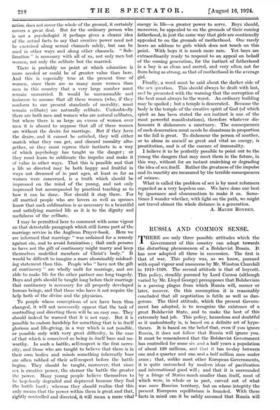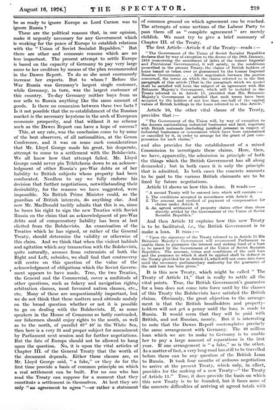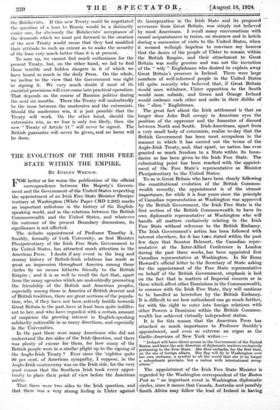RUSSIA AND COMMON SENSE.
THERE are only three possible attitudes which the Government of this country can adopt' tuvrards the disturbing phenomenon of a Bolshevist Russia. it has now adopted all three in succession. The first is that of war. This policy was, as we know, pursued with equal vigour and unsuccess by Mr. Winston Churchill in 1919-1920. The second attitude is that of boycott. This policy, steadily pursued by Lord Curzon (although varied by Mr. Lloyd George) presupposes that Bolshevism is a passing plague from which Russia will, sooner or later, recover. On this assumption it is reasonably concluded that all negotiation is futile as well as dan- gerous. The third attitude, which the present Govern- ment has adopted, is to recognize the existence of a great Bolshevist State, and to make the best of this extremely bad job. This policy, hazardous and doubtful as it undoubtedly is, is based on a definite set of hypo- theses. It is based on the belief that, even if you ignore Russia, it does not follow that Russia will ignore you. It must be remembered that the Bolshevist Government has controlled for some six and a half years a population of about 120 millions, and that it has to-day between one and a quarter and one and a half million men under arms-; that, unlike most other European Governments, it is quite untouched by modern ideas of pacification and international good will ; and that it is surrounded by a fringe of States much smaller than itself, most of which were, in whole or in part, carved out of what was once Russian territory, but on whose integrity the present European equilibrium is founded. With these facts in mind can it be safely assumed that Russia will be as ready to ignore Europe as Lord Curzon was to ignore Russia ?
These are the political reasons that, in our opinion, make it urgently necessary for any Government which is working for the peace of Europe to establish relations with the "Union of Soviet Socialist Republics." But there are other and economic reasons which are no less important. The present attempt to settle Europe is based on the capacity of Germany to pay very large sums to her creditors by means of the plan recommended in the Dawes Report. To do so she must enormously increase her exports. But to whom ? Before the War Russia was Germany's largest single customer, while Germany, in turn, was the largest customer of this country. To-day Germany neither buys from us nor sells to Russia anything like the same amount of goods. Is there no connexion between these two facts ? Is it not possible that the re-establishment of the Russian market is the necessary keystone in the arch of European economic prosperity, and that without it no scheme such as the Dawes Report can have a hope of success?
This, at any rate, was the conclusion come to by some of the best observers, of all nationalities, at the Genoa Conference, and it was on some such considerations that Mr. Lloyd George made his great, his desperate, attempt to come to a settlement with the BoLshevists. We all know how that attempt failed. Mr. Lloyd George could never pin Tchitcherin down to an acknow- ledgment of either Russia's pre-War debts or of her liability to British subjects whose property had been confiscated. Needless to say we fully endorse his decision that further negotiations, notwithstanding their desirability, for the reasons we have suggested, were impossible. No British Prime Minister could, as the guardian of British interests, do anything else. And now Mr. MacDonald tacitly admits that this is so, since he bases his right to sign the new Treaties with Soviet Russia on the claim that an acknowledgment of pre-War debts and of compensatory liability has been at last elicited from the Bolshevists. An examination of the Treaties which he has signed, or rather of the General Treaty, should determine the validity or otherwise of this claim. And we think that when the violent hubbub and agitation which any transaction with the Bolshevists, quite naturally, arouses from extremists of both the Right and Left; subsides, we shall find that controversy will centre on this question of the value of the acknowledgment of obligations which the Soviet Govern- ment appears to have made. True, the two Treaties, the General and the Commercial, cover a multitude of other questions, such as fishery and navigation rights,- arbitration clauses, most favoured nation clauses, etc., etc. Many of these are unquestionably important, but we do not think that these matters need obtrude unduly on the broad question whether or not it is possible to go on dealing with the Bolshevists. If, as some speakers in the House of Commons so hotly contended, our fishermen should enjoy rights to the south, as well as to the north, of parallel 67° 40' in the White Sea, then here is a very fit and proper subject for amendment by Parliament next session and for further negotiations. But the fate of Europe should not be allowed to hang upon the question. No, it is upon the vital articles of Chapter III. of the General Treaty that the worth of the document depends. Either these clauses are, as Mr. Lloyd George said, " a fake," or they do for the first time provide a basis of common principle on which a real settlement can be built. For no one who has read the Treaty can suppose for a moment that they constitute a settlement in themselves. At best they are only "an agreement to agree "—or rather a statement of common ground on which agreement can be reached. The attempts of some sections of the Labour Party to pass them off as "complete agreement" are merely childish. We must try to give a brief summary of -Chapter III. of the Treaty.
The first Article—Article 6 of the Treaty—reads :— "The Government of the Union of Soviet Socialist Republics declares that by way of exception to the decree of the 28th January, 1918 (concerning the annulment of debts of the former Imperial and Provisional Governments), it will satisfy, in the conditions prescribed in the present Treaty, the claims of British holders of Jeans issued or taken over or guaranteed by the former Imperial Russian Government. . . . After negotiation between the parties concerned, the terms on which the claims referred to in the first paragraph of this article [That is, the paragraph which we quote] shall be satisfied will form the subject of an agreement with His Britannic Majesty's Government, which will be included in the Treaty referred to in Article 11, provided that His Britannic Majesty's Government is satisfied that such terms have been accepted by the holders of not less than one-half of the capital values of British holdings in the loans referred to in this Article."
Article 10, the other vital clause of the Treaty, provides that :— "The Government of the Union will, by way of exception to the- deerees nationalizing industrial businesses and land, negotiate with British nationals (including juridical persons) in respect of industrial businesses or concessions which have been nationalized or cancelled by it, in order to arrange for the grant ofjust com- pensation for such claims."
and also provides for the establishment of a mixed Commission to investigate these claims. Here, then, we have, apparently, the admission in principle of both the things which the British Government has all along demanded ; but in both cases it is only the principle that is admitted. In both cases the concrete amounts to be paid to the various British claimants are to be fixed by future negotiations.
Article 11 shows us how this is done. It reads :—
"A second Treaty will be entered into which will contain :— 1. The conditions accepted in accordance with Article 6. 2. The amount and method of payment of compensation fdr claims under Article 8.
3. An agreed settlement of property claims other than those directly settled by the Government of the Union of Soviet Socialist Republics."
And then Article 12 explains how this new Treaty is to be facilitated, i.e., the British Government is to make a loan. It runs :— " Upon the signature of the Treaty referred to in Article 11 His Britannic Majesty's Government will recommend Parliament to enable them to guarantee the interest and sinking fund of a loan to be issued by the Government of the Union of Soviet Socialist Republics. The amount, terms and conditions of the said loan and the purposes to which it shall be applied shall be defined in the Treaty provided for in Article 11,whichwill not come into force until the necessary parliamentary authority for the guarantee of the said loan has been given."
It is this new Treaty, which might be called " The Treaty of Article 11," that is really to settle all the vital points. True, the British Government's guarantee for a loan does not come into force until by the clauses of this Treaty the Bolshevists have satisfied the British claims. Obviously, the great objection to the arrange- ment is that the British bondholders and property- holders will not get a penny until the loan is made to Russia. It would seem that they will be paid with British, and not Russian, money. But it is interesting to note that the Dawes Report contemplates precisely the same arrangement with Germany. The 40 million loan which we are to make to Germany is to enable her to pay a large amount of reparations in the first year. If one arrangement is "a fake," so is the other. As a matter of fact, a very long road hasstill to be travelled before there can be any question of the British Loan to Russia. It took four months of arduous negotiation to arrive at the present Treaty, which only, in effect, provides for the making of a new Treaty—" the Treaty of Article 11." True, it does provide the basis on which this new Treaty is to be founded, but it faces none of the concrete difficulties of arriving at agreed totals with the Bolshevists. If this new Treaty could be negotiated the question of a loan to Russia would be a distinctly easier one, for obviously the Bolshevists' acceptance of the demands which we must put forward in the creation of the new Treaty would mean that they had modified their attitude to such an extent as to make the security of the loan very much better than it is at present. , To sum up, we cannot feel much enthusiasm for the present Treaty, but, on the other hand, we fail to find those terrible and hidden dangers in it of which we have heard so much in the daily Press. On the whole, we incline to the view that the Government was right in signing it. We very much doubt if most of its essential provisions will ever come into practical operation. That depends on the course of Russian politics during the next six months. There the Treaty will undoubtedly be the issue between the moderates and the extremists. Should the moderates win, it is just possible that the Treaty will work. On the other hand, should the extremists win, as we fear is only too likely, then the new "Treaty of Article 11" will never be signed. The British guarantee will never be given, and no harm will be done.




































 Previous page
Previous page